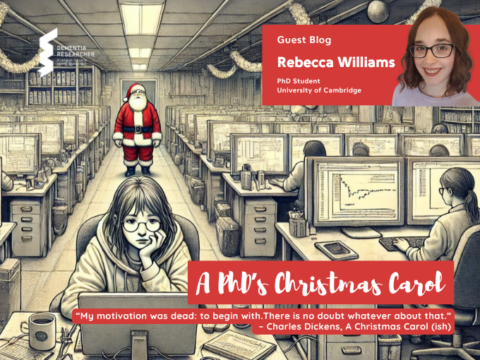Not only is this the year I will be finishing my PhD training, but this was also the year I had a go at writing my first ever fellowship application. If I’m honest with you, it was a hard slog. I’m very lucky I had extremely helpful supervisors to provide me with lots of advice along the way. But, I thought in this blog I’d share with you some of the ins and outs of the process. Because let’s be honest, there are many things within academia that we have no idea about until we actually have to do them – and fellowship applications certainly fall into that category!
Okay, here is my disclaimer. I’m still unaware of the outcome of my application – so this blog is not about how to write a stellar application (I’ll find out pretty soon if the application was pretty good though). But this blog will give you some insights into some of the things to expect from the process and kind of how to navigate it.
Choose your fellowship and check that you meet their criteria
Firstly, fellowships for different funding bodies are all very different. There are early career ones, such as the race against dementia scheme and the ARUK junior research fellowships and there are also more senior ones, such as the dementia research leader fellowship from the Alzheimer’s society. Whatever fellowship you’re thinking of applying for, check that you hit their eligibility criteria. You don’t want to be working for months (yes fellowships can take months to write) and then find out that you’re not in fact eligible.
Check what’s needed for the application
So, you’ve found out you’re eligible (YAY). Now you need to look in detail at what the application wants from you. Like I mentioned, each funder may require different things. But it’s most likely that you will always have to submit: a summary of your project, (usually a scientific and non-scientific one), a project proposal (which is made up of many sections (see below)), a budget for the project as well as justifications for your budget, a data management plan, a CV, and support letters from collaborators. There may also be sections about how your proposed project will impact the field (journey to impact), a section about public and patient involvement, secondment and training opportunities (if this is part of the fellowship scheme). Whatever project you propose, there will also be a section on ethics! One tip would be to make sure you through the online application in advance of the deadline, as when you tick certain boxes new sections can pop up – and you don’t want to be having to do extra sections you didn’t realise were needed right at the last minute!
Write your proposal
I’d say this is probably one of the really fun parts. This is the part where you get to really delve into your own ideas and the literature. You get to propose and figure out why and how you will investigate a scientific concept – and that is pretty cool. So briefly, the proposal is your idea, it’s the project that you want funding. It would include background literature (i.e how have you come to decide that this research is needed in your field), aims, hypotheses, experiments to test said hypotheses. You’ll need to describe the techniques you’ll use, the n of your experiments (justify your n with sample size calculations). You’ll also need to budget for everything you’ve proposed you will do (see next section for more details). Writing the proposal can definitely take time, especially when it’s the first one you write. I spent countless hours trying to perfect my aims, over and over again and to make my proposal as easy to read as possible (again I have no idea whether I was successful in this aspect or not yet). So, make sure you start early – it will always take longer than you think it will!
Plan your experiments so you can budget for the fellowship
Funders want to know that what you are proposing is feasible and worth their money. In order to do this, you have to plan your experiments and budget for everything you say you want to do (including budgeting for things like professional development courses and conferences). You’ll also need to budget for your own salary (and national insurance and pension contributions) in some applications. Budgeting may look different at each university (As each university has their own systems in place for you to do this). But the good part is that the university system should do all the calculations for you and their will be contacts in research services or the finance department that you can go to if you have any questions.
Update your CV early /Check CV requirements
Updating CVs can be time consuming – especially if you’ve left it ages since you last updated it! So do this early in the application process. Also, make sure to check what type of CV the funders want to see. ARUK have started asking for a narrative CV – which is actually really cool. The aim is to not just focus on papers and impact factor but actually the researcher as a whole! So, this way you can use things you’ve done during your training, such as talks you’ve given, any teaching experience, awards you’ve received. It’s a great way to showcase yourself and not just papers!
Don’t forget about all the extra bits (the data management plan)
I made the silly mistake of thinking that I was much closer to being finished than I actually was once I’d finished the main project proposal. So, in my head I thought I had less work to do then I actually did. In the week prior to my submission deadline (which was a week before the actual deadline) I had to do my data management plan and my budget justification. These definitely took me longer than I thought they would. My tip would be to do these as early as possible.
Ask for support letters EARLY
We all know that academics are busy people. Whoever you ask for a support letter, whether this be your PhD/postdoc supervisors, or collaborators you’ve put in the grant, you need to make sure you give them time to write these. It can be helpful to send an email with what is required (input the link to the specific scheme you’re applying for so they can tailor it to what’s needed). In the email, don’t forget to put when you need the letter by, and make this date at least a couple of weeks before the final submission deadline. The last week of submission can be a little stressful (this is my experience anyway) so having all of these things ready way before submission may save you some stress.
Check if there are any internal requirements you need to fulfil to submit
This is something you should check very early on – if you don’t meet these requirements your university may not let you submit. In my department I needed to submit my proposal internally at least one month before the deadline and have it reviewed by two members of staff. There will also be internal requirements on the amount of time you need to submit your application prior to the actual deadline. At most universities, you need you to submit your budget around one week before the actual submission date in order for this to be signed off by the finance department. So be aware of these dates early on and definitely plan to submit your application at least 1 week before the actual deadline. Remember, these timelines may be very different at each university so check early and plan around them!
My biggest piece of advice is give yourself time. There is no way you can write a full fellowship application in a couple of weeks – especially if it’s your first one!
Check the requirements of the scheme, the requirements of your university and get in touch with your research services team early! They are the experts on applying for fellowships and they will know all about the university deadlines. So, if you’re considering applying for a fellowship soon – good luck!

Beth Eyre
Author
Beth Eyre is a PhD Student at The University of Sheffield, researching Neurovascular and cognitive function in preclinical models of Alzheimer’s disease. Beth has a background in psychology, where she gained her degree from the University of Leeds. Inside and outside the lab, Beth loves sharing her science and we are delighted to have her contributing as a regular blogger with Dementia Researcher, sharing her work and discussing her career.

 Print This Post
Print This Post





